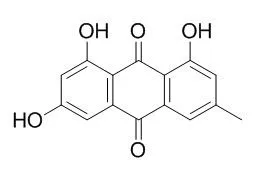| Kinase Assay: |
| Mol Carcinog. 2015 Mar;54(3):167-77. | | Emodin modulates epigenetic modifications and suppresses bladder carcinoma cell growth.[Pubmed: 24115089] | We investigated whether a natural product, Emodin, has the ability to reverse these two epigenetic modifications and inhibit bladder cancer cell growth.
METHODS AND RESULTS:
Emodin significantly inhibited the cell growth of four bladder cancer cell lines in a dose- and time-dependent manner. Emodin treatment did not induce specific cell cycle arrest, but it altered epigenetic modifications. Emodin treatment resulted in the suppression of pH3Ser10 and increased H3K27me3, contributing to gene silencing in bladder cancer cells. Microarray analysis demonstrated that oncogenic genes including fatty acid binding protein 4 (FABP4) and fibroblast growth factor binding protein 1 (HBP17), RGS4, tissue inhibitor of metalloproteinase 3 (TIMP3), WNT5b, URB, and collagen, type VIII, alpha 1 (COL8A1) responsible for proliferation, survival, inflammation, and carcinogenesis were significantly repressed by Emodin. The ChIP assays also showed that Emodin increased H3K27me3 but decreased pH3Ser10 modifications on the promoters of repressed genes, which indicate that Emodin reverses the cancer epigenetics towards normal epigenetic situations.
CONCLUSIONS:
In conclusion, our work demonstrates the significant anti-neoplastic activity of Emodin on bladder cancer cells and elucidates the novel mechanisms of Emodin-mediated epigenetic modulation of target genes. Our study warrants further investigation of Emodin as an effective therapeutic or preventive agent for bladder cancer. | | Int Immunopharmacol. 2014 Aug;21(2):354-60. | | Emodin inhibits LPS-induced inflammatory response by activating PPAR-γ in mouse mammary epithelial cells.[Pubmed: 24874440] | Emodin, an anthraquinone derivative isolated from the rhizomes of Rheum palmatum, has been reported to have a protective effect against lipopolysaccharide (LPS)-induced mastitis. However, the underlying molecular mechanisms are not well understood.
METHODS AND RESULTS:
The aim of this study was to investigate the molecular mechanisms of Emodin in modifying lipopolysaccharide (LPS)-induced signaling pathways in mouse mammary epithelial cells (MEC). The pro-inflammatory cytokines were determined by ELISA. Nuclear factor-κB (NF-κB), inhibitory kappa B (IκBα) protein, p38, extracellular signal-regulated kinase (ERK), c-Jun N-terminal kinase (JNK) and PPAR-γ were determined by Western blotting. The results showed that Emodin suppressed tumor necrosis factor-alpha (TNF-α), interleukin-6 (IL-6), iNOS and COX-2 expression. We also found that Emodin inhibited LPS-induced NF-κB activation, IκBα degradation, phosphorylation of ERK, JNK and P38. Furthermore, Emodin could activate PPAR-γ and the anti-inflammatory effects of Emodin can be reversed by GW9662, a specific antagonist for PPAR-γ.
CONCLUSIONS:
In conclusion, our results demonstrate that Emodin activates PPAR-γ, thereby attenuating LPS-induced inflammatory response. |
|






 Cell. 2018 Jan 11;172(1-2):249-261.e12. doi: 10.1016/j.cell.2017.12.019.IF=36.216(2019)
Cell. 2018 Jan 11;172(1-2):249-261.e12. doi: 10.1016/j.cell.2017.12.019.IF=36.216(2019) Cell Metab. 2020 Mar 3;31(3):534-548.e5. doi: 10.1016/j.cmet.2020.01.002.IF=22.415(2019)
Cell Metab. 2020 Mar 3;31(3):534-548.e5. doi: 10.1016/j.cmet.2020.01.002.IF=22.415(2019) Mol Cell. 2017 Nov 16;68(4):673-685.e6. doi: 10.1016/j.molcel.2017.10.022.IF=14.548(2019)
Mol Cell. 2017 Nov 16;68(4):673-685.e6. doi: 10.1016/j.molcel.2017.10.022.IF=14.548(2019)